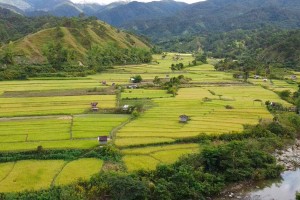BANGUED, Abra(PIA)-- Farming towns far from the provincial capital are more vulnerable to the adverse effects of climate change.
This is based on the results of the Climate Risk Vulnerability Assessment (CRVA) conducted by the Benguet State University for the Adaptation and Mitigation Initiative in Agriculture in Abra program of the Department of Agriculture.

Project leader Lynn Talkasen explained that the study conducted in February 2023 showed that far-flung municipalities are more vulnerable to climate change because of their low adaptive capacity.
“Kapag titignan ‘yung adaptive capacity for all provinces of Cordillera except for Apayao, ay mga government centers lang ‘yung mataas ang adaptive capacity pero yung mga outskirts ‘yun ang mababa ang kanilang adaptive capacity,which contributes to their vulnerability to climate change,” she said.
Adaptive capacity is the ability of the community to adjust to the effects of climate change, and maximize opportunities to cope with the consequence of changes in temperature or precipitation.
Talkasen shared that the adaptive capacity of municipalities is affected by the interventions such as innovation and technologies in agriculture that farming communities receive.
“All over Cordillera, talagang vulnerable ang ating villages or municipalities sa climate change especially sa climate change adaptation is nakikita pa din natin yung impact ng mga government programs talaga,” she added.
Farming villages in or near the provincial capitals have more access to agricultural services and assistance, as compared to those in the outskirts she said.
Aside from adaptive capacity, the CRVA also looked in the sensitivity of the priority crops in the province that include rice, corn, coffee, and mango. The sensitivity analysis looked into the suitability of the different crops to changes in temperature and precipitation.
The exposure of the different municipalities to climate-related hazards such as drought, flood, tropical cyclone, soil erosion, and landslide was also studied.

Talkasen said the results of the assessment that were validated during a recent dialogue with farmer leaders will be the basis for the prioritizing technological interventions for climate adaptation and mitigation in the municipalities of Abra.
She noted that allotting funds for climate-adaptive technologies and innovations especially in the towns far from government centers can help improve the capacity of farming communities to cope with the impacts of climate change by 2050.(JJPM-PIA CAR, Abra)




